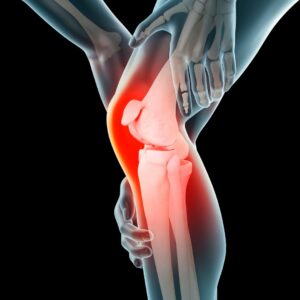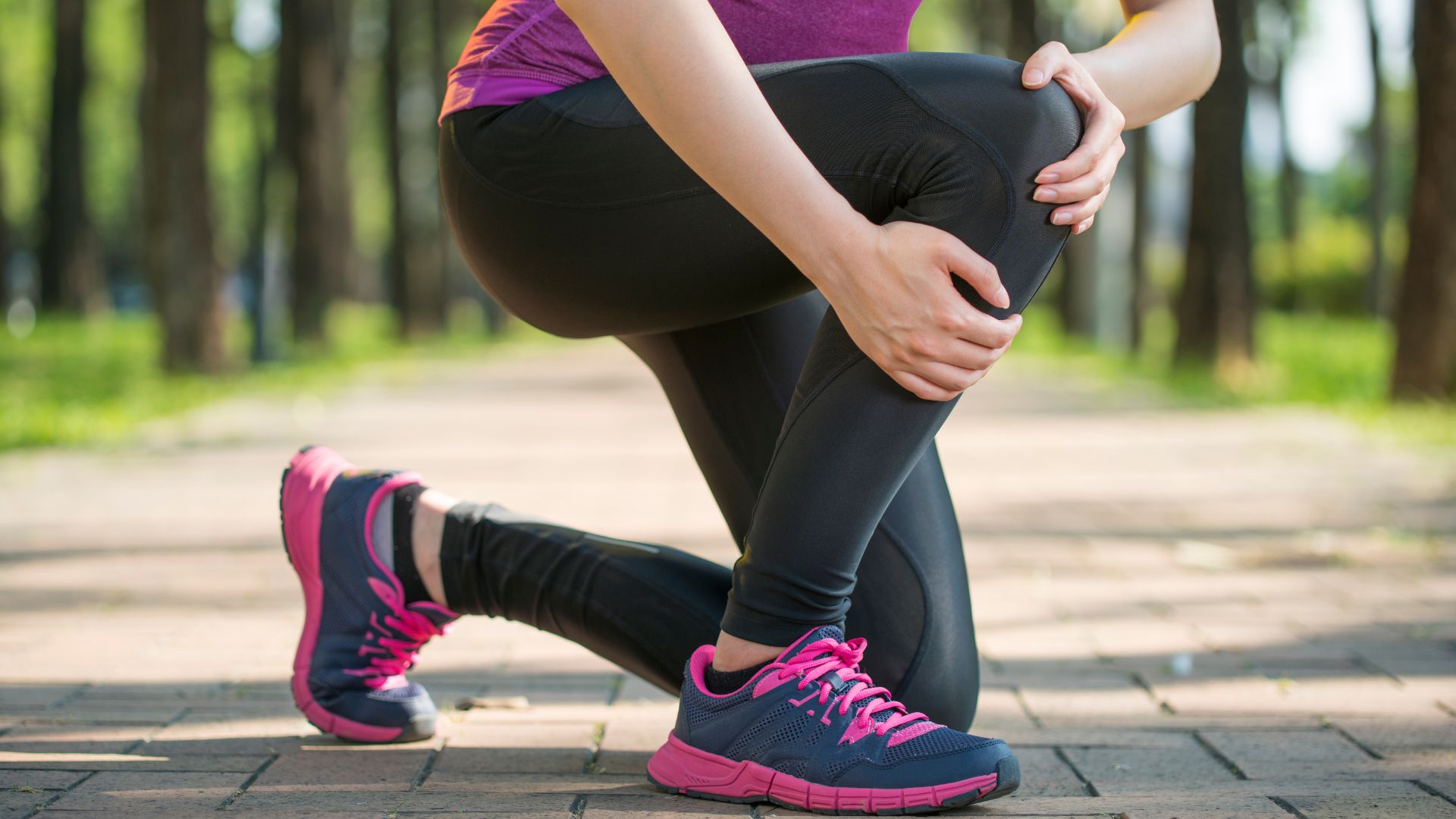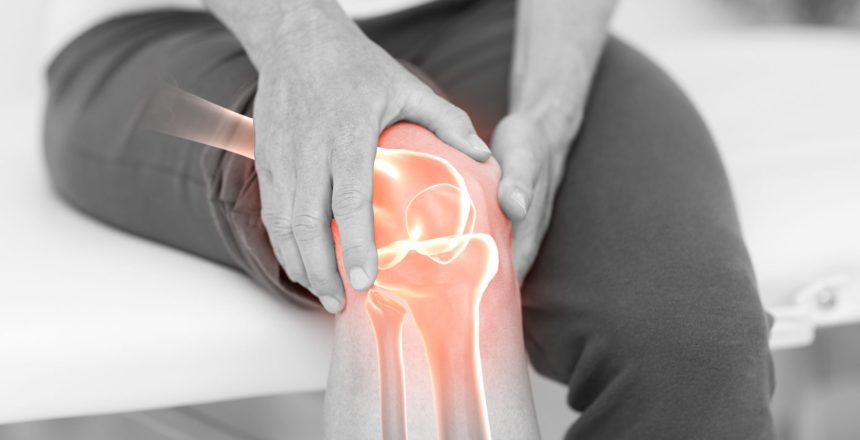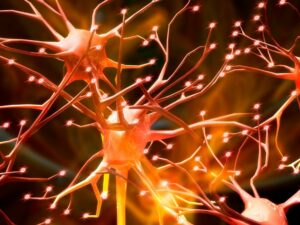Recurring knee pain affects about 25% of the adult population, causing limited mobility and even dramatically impacting their quality of life.
Knee pain can interrupt or keep you from the physical activities you enjoy. And when it’s severe, you may even feel like you cannot exercise at all. Perhaps even a brisk walk can trigger painful symptoms, especially if you suffer from osteoarthritis.
Because of knee pain’s negative implications on a healthy lifestyle, it’s important to find effective treatments targeting the cause of your knee pain to get back on the path to overall well-being.
Follow along as we explain what causes knee pain and go through the most common types of knee pain that may be impacting your life.
What causes knee pain?
The knee is one of the most vulnerable joints in the body. If you’re suffering from knee pain, the discomfort is usually attributed to injury, age, or repeated stress on the knee. This type of ‘stress’ includes kneeling, lifting, and walking as well as higher impact activities like running or training.

The knee joint connects the shin bone (tibia), the thigh bone (femur), and of course, the knee cap. Your knee is the connecting point of your leg bones, with cartilage to absorb shock from movements. Tendons, ligaments, and muscles hold everything together to keep you walking, running, swimming, etc. without damage to the legs. In a nutshell, your knee is the connector and shock absorber of the legs, protecting you from injury.
But what happens when the knee is in trouble?
Because of the knee’s role as a connector and shock absorber, if it becomes damaged, pain is sure to follow.
Depending on your lifestyle, age, and activities, your knee pain could be caused by a number of factors. Let’s go through the common types of knee pain and their causes, so you can determine how to address these underlying issues.
Top 6 Types of Knee Pain and Their Causes
Before you can treat your knee pain with any hope of not just relief but correction, we need to understand the nature of your pain. To narrow things down, we’re highlighting the most common types of knee pain. We’re covering everything from knee pain at night, to knee pain behind the knee, knee pain when running, etc. Odds are, your knee pain will fit into one of these categories. Remember that most knee pain is ultimately caused by:
- Aging
- Injury
- Repeated stress on the knee
No one can stop the aging process, but there are steps you can take to minimize your pain by leading a healthy lifestyle. As far as injuries go, be sure to speak with your doctor or chiropractor if you feel any of the below issues are caused by a specific injury.
And finally, repeated stress on the knee may be due to the nature of your work or your exercise regimen. Be prepared to make a lifestyle change or slight adjustments to your workout in order to better deal with knee pain.
Knee Pain from Osteoarthritis
Osteoarthritis is at the root of chronic joint inflammation, and the American College of Rheumatology estimates it affects over 27 million Americans aged 25+. Knee pain caused by osteoarthritis is one of the top reasons people receive knee transplants. Osteoarthritis also happens to be the #1 underlying cause of knee pain in people over the age of 50.
What is osteoarthritis?
Osteoarthritis happens when the cartilage that protects and cushions the bone ends wears down over a long period of time. This is why osteoarthritis is more common in people aged 50+, as the natural aging process and years of stress on the joints take their toll.
Knee pain from osteoarthritis is often accompanied by pain in the hands, back, hips, or any other major joints.
While you cannot undo the damage to the joints caused by osteoarthritis, many can manage knee pain with some simple lifestyle adjustments, including lower-impact exercises, an anti-inflammatory diet, and over-the-counter pain medications. Promising natural remedies for knee pain from osteoarthritis include various anti-inflammatory herbs and plants like CBD oil and turmeric.
If you’re under the age of 50, you can help prevent osteoarthritis by:
- Maintaining a healthy body weight
- Preventing joint injury by warming up prior to exercise, doing low-impact exercise, etc.
- Keeping your blood sugar in check
- Staying active
- Listening to your body
Knee Pain Behind the Knee
Knee pain behind the knee isn’t uncommon among active adults, but it’s important to monitor your symptoms, especially if you have a more sedentary lifestyle. According to Miho Tanaka, MD of the Department of Orthopaedic Surgery at Johns Hopkins Hospital, keep an eye out for numbness of the leg, blood clots, and fever, as these can be signs your knee pain warrants a trip to the ER.
But don’t panic. Blood clots associated with pain behind the knee can be addressed quickly and aren’t the most common trigger. More likely, pain behind the knee is caused by one of the following factors.
Common Causes of Pain Behind the Knee
- Arthritis
- Gout
- Runner’s knee
- Meniscus tear- Meniscus tears are one of the most common injuries that can result in knee pain. These tears are caused in sports and higher impact exercise from direct contact or sudden squatting and twisting. On the other hand, older people may develop meniscus tears from worn-out tissue. In these cases, a small move or twist can be enough to tear the menisci.
- Baker’s Cyst
- Strains/cramps in calf or hamstring
Knee Pain When Running
Knee pain when running— also known colloquially as runner’s knee or officially as patellofemoral pain syndrome— feels very different from pain at the back of the knee. Runner’s knee involves pain in the kneecap, particularly at the top where it connects the upper thigh bone. It usually affects people who run or exercise and have developed joint damage through repeated high-impact movements. If you have knee pain when running, odds are you may feel it when kneeling or going up and down stairs as well. That’s because torn cartilage, worn-out cartilage, and/or strained tendons are at the root of the problem and will trigger pain during other activities besides running.

Common Causes of Knee Pain When Running
- Injury to the kneecap
- Arthritis
- Overuse
- Flat feet
Knee Pain When Bent
Sharp pain that happens at the bend of the knee is no laughing matter. We all need to constantly bend our knees to walk, squat, ride a bicycle, touch our toes, and more. Most of the time, acute pain when bending the knee is a result of a minor-to-moderate meniscus tear. A minor tear usually heals within a few weeks if proper steps are taken like resting and elevating the knee. Moderate tears also heal within a matter of weeks but need to be adequately addressed to prevent more problems in the future. Finally— like all the other types of knee pain on this list— arthritis can often be the culprit.
Common Causes of Knee Pain When Bent
- Meniscus tear
- Arthritis
- Overuse
Knee Pain from Sitting
If you experience knee pain after sitting for long periods of time, the good news is it’s probably caused by sitting itself. Particularly for those who have to sit at a desk for work, knee pain can flare up simply because the joints begin to stiffen from lack of movement. Doing this for months or years can weaken the knee joint and even cause premature degeneration. Unless there is an underlying factor such as osteoarthritis or a knee injury, you can probably solve this problem with a little research into the best ergonomic chairs for knees. You can also try taking more breaks or buying a standing desk to keep the blood flowing to your knees during the workday.
Common Causes of Knee Pain from Sitting
- Lack of movement/sedentary lifestyle
- Poor alignment/positioning while seated
- Arthritis
- Pre-existing knee injury
Knee Pain at Night
Finally, this last type of knee pain is a bit of a departure from the others on the list. There is no condition that will cause your knee pain to flare up specifically at night. Rather, it’s more of a compounded issue that just happens to feel more intense at bedtime. That’s mainly due to 3 reasons, but nighttime knee pain is a probable accomplice of all the other types on our list as well.
Common Causes of Knee Pain at Night
- Mental– When it’s time for bed, the mind tries to wind down from external stressors from the day. In other words, because you’re not preoccupied mentally with other things, knee pain can feel more pronounced.
- Compounded inflammation– If you’ve been on your feet all day or doing high-impact exercise, the compounded stress can trigger nighttime pain in the knee.
- Tightened tendons– When you go to sleep, your tendons naturally become tighter than in a waking state. The body and mind know that it is time to stop moving. Consequently, there is less synovial fluid being pumped around the knee. This fluid circulates around our joints to help us bend and move. With less of it flowing freely, the knee can experience swelling and inflammation, leading to nighttime knee pain.
What’s causing your knee pain?
While we’ve detailed the typical types of knee pain, remember that at the end of the day you can usually lump the root cause of your knee pain into three broad categories:
- Aging
- Injury
- Repeated stress on the knee
Now that you know the most common types of knee pain and the causal factors that lurk beneath them, you can hopefully get closer to pinpointing what’s triggering your knee pain. If you are unsure of how to mitigate your symptoms or you can’t seem to shake your knee pain, it’s a good idea to speak to a healthcare professional like a chiropractor who can help you map out a knee pain treatment plan. When in doubt, ask the pros, so that you don’t end up causing any further damage to this important joint.
Next Steps
If you’re in the Austin or Bee Caves area, learn more about our natural treatment for knee pain or come by for a free consultation.
We will help treat your knee pain naturally, without surgery, injections, NSAIDs, or other “solutions” that don’t address the root issue(s) causing your pain while doing no harm in the process.






